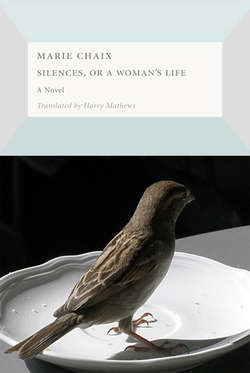Читать книгу Silences, or a Woman's Life - Marie Chaix - Страница 12
На сайте Литреса книга снята с продажи.
ОглавлениеThe night wore on. I keep expecting to hear something stirring; but it’s the hour between night and morning when, even in Paris, everything is calm. There is only from time to time the distant growl of a car; and, much nearer, the throbbing tick tock of the alarm clock that fills my head. It’s the hour when the sleep of city dwellers is deep, before the familiar noises of morning. Juliette has fallen asleep. I’m sitting alone, facing the empty chair. Soon I’ll hear the wine merchant rolling up his iron curtain, the clash of bottles in wooden crates, the metallic sound of stands being set up on the sidewalk. Today is market day.
But for the moment it’s still the damp bitter time when the eyelids of those standing watch grow heavy, the time when night owls are returning from their festivities, the time when you came home from the ball. If I had moved out of the red circle of the little lamp that insulates me from this baneful night, if I groped my way to your room, perhaps the door would open on a seventeen-year-old young woman, asleep in a mauve dress sprigged with faded pansies: perhaps, perhaps . . . if the stories you once told me were not tall tales, and if the years, the wearing years, hadn’t killed Sleeping Beauty.
I sit rooted to my chair. Morning is tracing gray stripes on the blind, and I wish I could utterly expel from my weariness the image of an old woman I no longer know, now lying in the depths of a most incomprehensible solitude. Around me objects are emerging from the shadows. It’s as though they were speaking of you through a veil—as if, no longer destined to exist in the light of your gaze, your touch, your scent, they were withdrawing from the oncoming day that will render them forever useless; as if they were already vanishing into the museum of oblivion.
I almost fell asleep. Rousing myself, anxious not to sink into some cloying dream—boarded up in a wooden tunnel, or suffocating under monstrous quilts—I get up and walk over to the row of photographs above the piano. Among the glassed-in images that now reflect the faint light of day filtering in from outside, I rediscover the young woman standing next to her fiancé, looking very serious. His parents insisted on the photograph; she could have done without it. She didn’t have the heart to pose among baskets of carnations and hydrangeas, and asked for a plain backdrop. Her dress is dark-colored and belted at the hips. Not a single jewel. Her hair is cut short; her gaze is infinitely remote. He stands very straight, his face emerging sharply from the collar of his uniform, in which he seems a little stiff, with his gloved hands clasped in front of him. They don’t look like a couple. And yet they adore each other.
Alice’s mother had been getting worse and worse, and the engagement would have been announced under rather gloomy circumstances had not the fiancé’s parents arrived, bringing with them in their shiny limousine all the glamor of Parisian chic. The cases of champagne that the future father-in-law solemnly unloaded made a strong impression on Alice’s grandmother, who had made peace with her daughter for the occasion. Behind her pincenez, her contented glance shifted from the fiancé’s mother’s silver foxes to his father’s elegant fur-lined overcoat, taking in on the way, among other things, the pearl necklace, diamond earrings, and the gold watch chain.
Once the ball was over, bringing matters to this point hadn’t been simple. “She’s much too young.” “He hasn’t finished college.” “He’s a chemical engineer,” Anna complained, thinking of the crocodile. “He’s a nice enough looking young man,” Grandmother declared, “but he has no moustache, my dear, and that is not proper.”—“You had to choose a foreigner for your wife,” his father grumbled—he was a decorated veteran of World War I for whom Alsace was still part of Germany and who—most important—had picked out for his son a plump heiress from his own neck of the woods. “You shouldn’t have sent me to Mulhouse,” the son retorted. “I’ve lost my heart—I won’t settle for anyone but her.” As for Alice, she threatened to jump off the roof of the Strasbourg cathedral . . . And so they were engaged.
